
Chocolate is a food product made from roasted and ground cacao seed kernels, that is available as a liquid, solid or paste, on its own or as a flavoring agent in other foods. Cacao has been consumed in some form since at least the Olmec civilization, and the majority of Mesoamerican people ─ including the Maya and Aztecs ─ made chocolate beverages.

The economy of Ghana has a diverse and rich resource base, including the manufacturing and exportation of digital technology goods, automotive and ship construction and exportation, and the exportation of diverse and rich resources such as hydrocarbons and industrial minerals. These have given Ghana one of the highest GDP per capita in West Africa. Owing to a GDP rebasement, in 2011 Ghana became the fastest-growing economy in the world.

The cocoa bean or simply cocoa, also called the cacao bean or cacao, is the dried and fully fermented seed of Theobroma cacao, from which cocoa solids and cocoa butter can be extracted. Cocoa beans are the basis of chocolate, and Mesoamerican foods including tejate, an indigenous Mexican drink that also includes maize.

Nestlé S.A. is a Swiss multinational food and drink processing conglomerate corporation headquartered in Vevey, Vaud, Switzerland. It is the largest publicly held food company in the world, measured by revenue and other metrics, since 2014. It ranked No. 64 on the Fortune Global 500 in 2017 and No. 33 in the 2016 edition of the Forbes Global 2000 list of largest public companies.
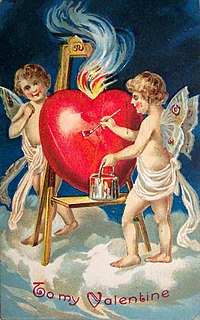
Valentine's Day, also called Saint Valentine's Day or the Feast of Saint Valentine, is celebrated annually on February 14. It originated as a Christian feast day honoring one or two early Christian martyrs named Saint Valentine and, through later folk traditions, has become a significant cultural, religious, and commercial celebration of romance and love in many regions of the world.
Mars, Incorporated is an American multinational manufacturer of confectionery, pet food, and other food products and a provider of animal care services, with US$40 billion in annual sales in 2020.
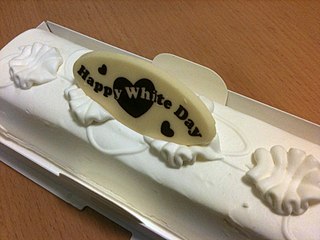
White Day is celebrated annually on March 14, one month after Valentine's Day, when people give reciprocal gifts to those who gave them gifts received on Valentine's Day. It began in Japan in 1978; since then, its observance has spread to several other Asian nations.

A chocoholic is a person who craves or compulsively consumes chocolate. The word "chocoholic" was first used in 1968, according to Merriam-Webster. It is a portmanteau of "chocolate" and "alcoholic". The term is used loosely or humorously to describe a person who is inordinately fond of chocolate; however, there is medical evidence to support the existence of actual addiction to chocolate. Psychoactive constituents of chocolate that trigger a ‘feel-good’ reaction for the consumer include tryptophan and phenylethylamine, which may contribute to cravings and addiction-like responses, particularly in people with specific genetic alleles. The quantity of sugars used in chocolate confections also impacts the psychoactive effects of chocolate.
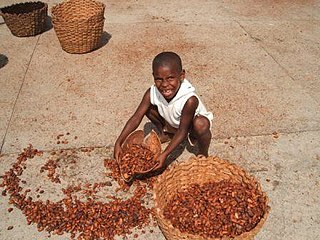
The Harkin–Engel Protocol, sometimes referred to as the Cocoa Protocol, is an international agreement aimed at ending the worst forms of child labor and forced labor in the production of cocoa, the main ingredient in chocolate. The protocol was negotiated by U.S. Senator Tom Harkin and U.S. Representative Eliot Engel in response to a documentary and multiple articles in 2000 and 2001 reporting widespread child slavery and child trafficking in the production of cocoa. The protocol was signed in September 2001. Joint Statements in 2001, 2005 and 2008 and a Joint Declaration in 2010 extended the commitment to address the problem.
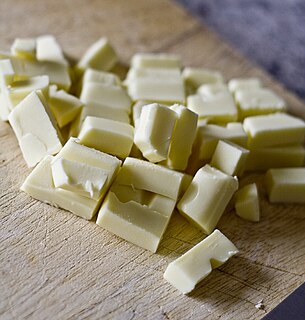
White chocolate is a chocolate confection, pale ivory in color, made from cocoa butter, sugar, milk solids and sometimes vanilla. White chocolate does not contain cocoa solids, which are found in other types of chocolate, such as milk chocolate and dark chocolate. It is solid at room temperature 25 °C (77 °F) because the melting point of cocoa butter, the only cocoa bean component of white chocolate, is 35 °C (95 °F).

Ivory Coast and Ghana, together, during the 2018/19 cocoa-growing season, research commissioned by the U.S Department of Labor was conducted by NORC at the University of Chicago in these two countries and found that 1.48 million children are engaged in hazardous work on cocoa farms including working with sharp tools and agricultural chemicals and carrying heavy loads. That number of children is significant, representing 43 percent of all children living in agricultural households in cocoa growing areas. During the same period cocoa production in Cote d’Ivoire and Ghana increased 62 percent while the prevalence of child labour in cocoa production among all agricultural households increased 14 percentage points. Attention on this subject has focused on West Africa, which collectively supplies 69% of the world's cocoa, Côte d'Ivoire in particular, supplying 35%. The 2016 Global Estimates of Child Labour indicate that one-fifth of all African children are involved in child labour. Nine percent of African children are in hazardous work. It is estimated that more than 1.8 million children in West Africa are involved in growing cocoa. A 2013–14 survey commissioned by the Department of Labor and conducted by Tulane University found that an estimated 1.4 million children aged 5 years old to 11 years old worked in agriculture in cocoa-growing areas, while approximately 800,000 of them were engaged in hazardous work, including working with sharp tools and agricultural chemicals and carrying heavy loads. According to the NORC study, methodological differences between the 2018/9 survey and earlier ones, together with errors in the administration of the 2013/4 survey have made it challenging to document changes in the number of children engaged in child labour over the past five years.
"Big Chocolate" is a business term assigned to multi-national chocolate food producers, akin to the terms "Big Oil," "Big Pharma," and "Big Tobacco".

Ivory Coast leads the world in production and export of the cocoa beans used in the manufacture of chocolate, as of 2012, supplying 38% of cocoa produced in the world. West Africa collectively supplies two thirds of the world's cocoa crop, with Ivory Coast leading production at 1.8 million tonnes as of 2017, and nearby Ghana, Nigeria, Cameroon and Togo producing additional 1.55 million tonnes. Ivory Coast overtook Ghana as the world's leading producer of cocoa beans in 1978, and today is highly dependent on the crop, which accounts for 40% of national export income. The primary non-African competitor of Ivory Coast is Indonesia, which went from having almost nonexistent domestic cocoa industry in the 1970s to becoming one of the largest producers in the market by the early 2000s. According to the UN FAO, Indonesia overtook Ghana and became the second-largest producer worldwide in 2006. Large chocolate producers such as Cadbury, Hershey's, and Nestle buy Ivorian cocoa futures and options through Euronext whereby world prices are set.

The Cocoa Processing Company Limited is a Ghanaian cocoa processing company. They are listed on the stock index of the Ghana Stock Exchange, the GSE All-Share Index. It formed in 1981.

Fair trade cocoa is an agricultural product harvested from a cocoa tree using a certified process which is followed by cocoa farmers, buyers, and chocolate manufacturers, and is designed to create sustainable incomes for farmers and their families. Companies that use fair trade certified cocoa to create products can advertise that they are contributing to social, economic, and environmental sustainability in agriculture.
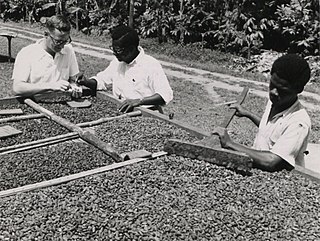
Cocoa is the chief agricultural export of Ghana and Ghana's main cash crop. Ghana is the second largest cocoa exporter in the world, after Ivory Coast. Ghana's cocoa cultivation, however, is noted within the developing world to be one of the most modelled commodities and valuables.

World Chocolate Day, sometimes referred to as International Chocolate Day, or just Chocolate Day, is an annual celebration of chocolate, occurring globally on July 7, which some suggest to be the anniversary of the introduction of chocolate to Europe in 1550. The observance of World Chocolate Day dates back to 2009.
Kofi Akpabli is a Ghanaian academic, journalist, publisher, tourism consultant and cultural activist. He is a two-time winner of the CNN Multichoice African Journalist for Arts and Culture Awards. His latest work 'Made in Nima' has been featured in the new Commonwealth Anthology which was published in May 2016 Safe House: Explorations into Creative Non-Fiction. Akpabli has four books to his credit and currently works as a lecturer at Central University College in Ghana. He is a founding member of Ghana Cultural Forum and has participated in Xplore FrankfurtRheinemann 2012, Tallberg Forum, Sweden 2011, Berlin Art Festival 2010 and the Düsseldorf Art Preview 2010.
The Ghana Tourism Authority is a Ghanaian state agency under the Ministry of Tourism, Culture and Creative Arts responsible for the regulation of tourism in Ghana by marketing, promoting, licensing, classifying, researching and developing tourism facilities and services in the country.

Economic history of Ghana details the economic situation of Ghana since pre-colonial times to date.













